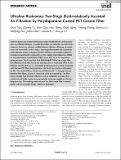Ultralow Resistance Two‐Stage Electrostatically Assisted Air Filtration by Polydopamine Coated PET Coarse Filter
Author(s)
Tian, Enze; Yu, Qipeng; Gao, Yilun; Wang, Hua; Wang, Chao; Zhang, Yinping; Li, Baohua; Zhu, Meifang; Mo, Jinhan; Xu, Guiyin; Li, Ju; ... Show more Show less
DownloadAccepted version (2.378Mb)
Open Access Policy
Open Access Policy
Creative Commons Attribution-Noncommercial-Share Alike
Terms of use
Metadata
Show full item recordAbstract
Airborne particulate matters (PM) pose serious health threats to the population, and efficient filtration is needed for indoor and vehicular environments. However, there is an intrinsic conflict between filtration efficiency, air resistance, and service life. In this study, a two-stage electrostatically assisted air (EAA) filtration device is designed and the efficiency-air resistance-filter life envelope is significantly improved by a thin coating of polydopamine (PDA) on the polyethylene terephthalate (PET) coarse filter by in situ dopamine polymerization. The 8 mm thick EAA PDA-140@PET filter has a high filtration efficiency of 99.48% for 0.3 µm particles, low air resistance of 9.5 Pa at a filtration velocity of 0.4 m s-1 , and steady performance up to 30 d. Compared with the bare PET filter, the penetration rate for 0.3 µm particles is lowered by 20×. The coated PDA is of submicron thickness, 10-3 × the gap distance between filter fibers, so low air resistance could be maintained. The filter shows steadily high filtration efficiency and an acceptable increase of air resistance and holds nearly as many particles as its own weight in a 30 day long-term test. The working mechanism of the EAA coarse filter is investigated, and the materials design criteria are proposed.
Date issued
2021-08Department
Massachusetts Institute of Technology. Department of Nuclear Science and Engineering; Massachusetts Institute of Technology. Department of Materials Science and EngineeringJournal
Small
Publisher
Wiley